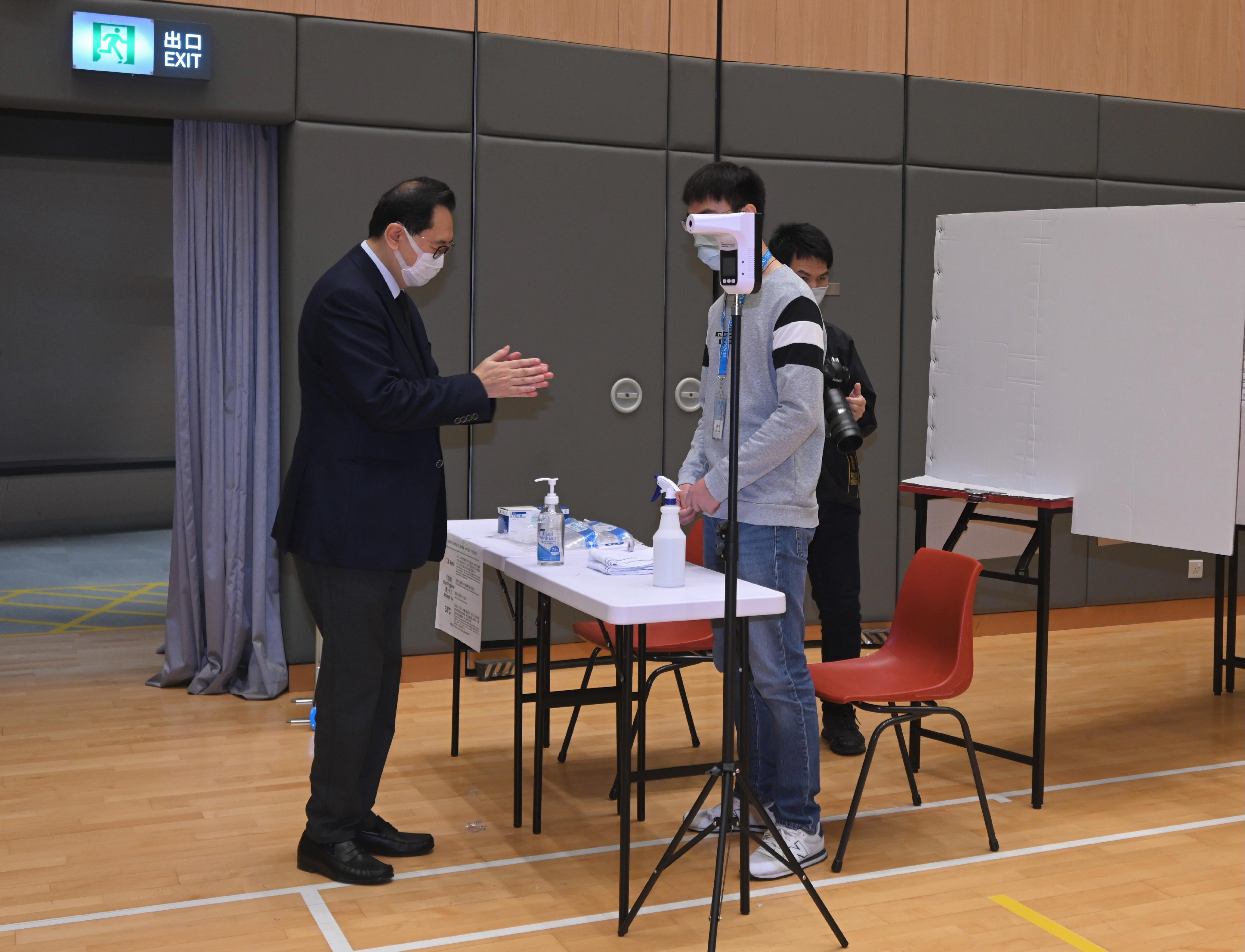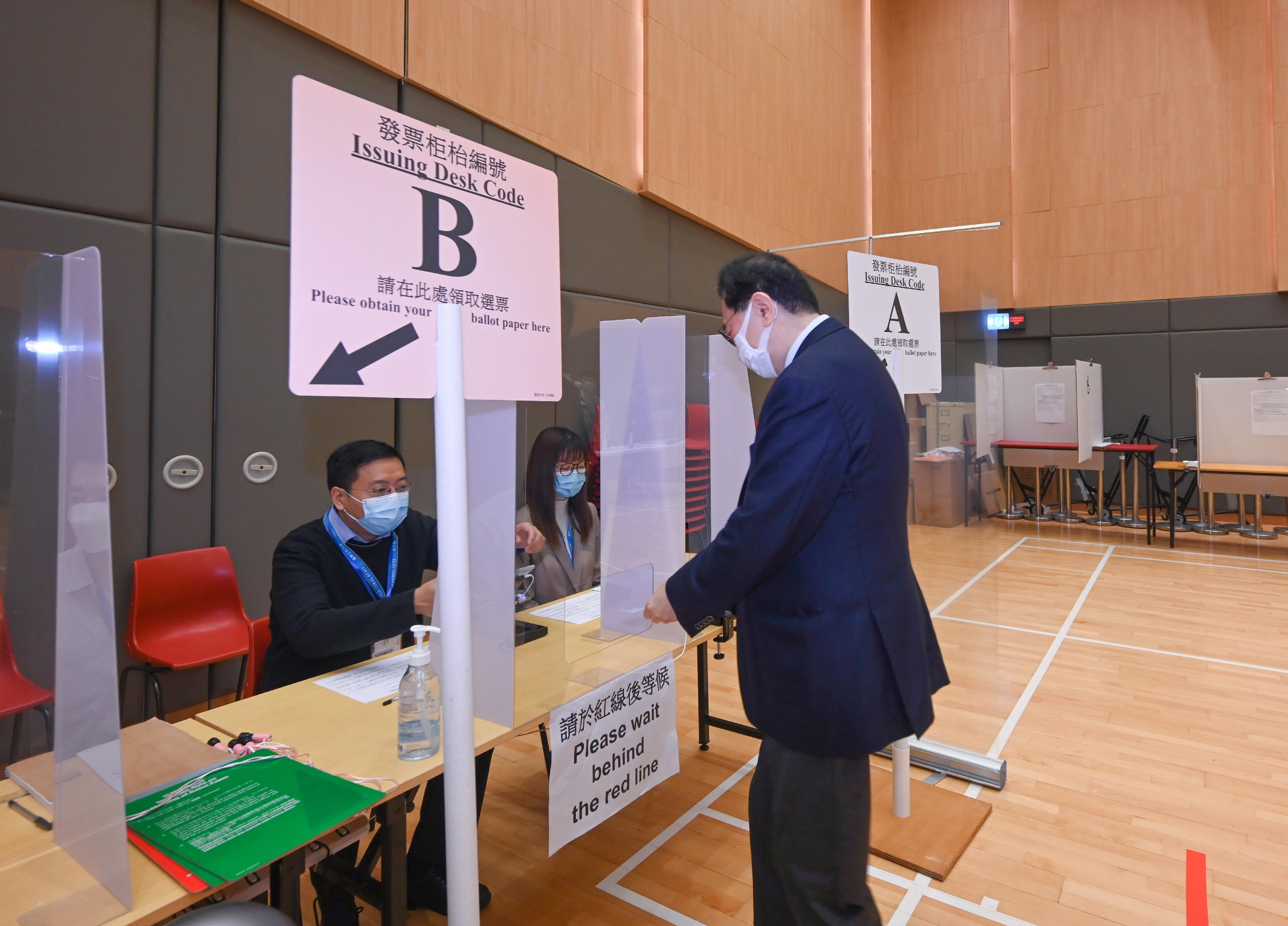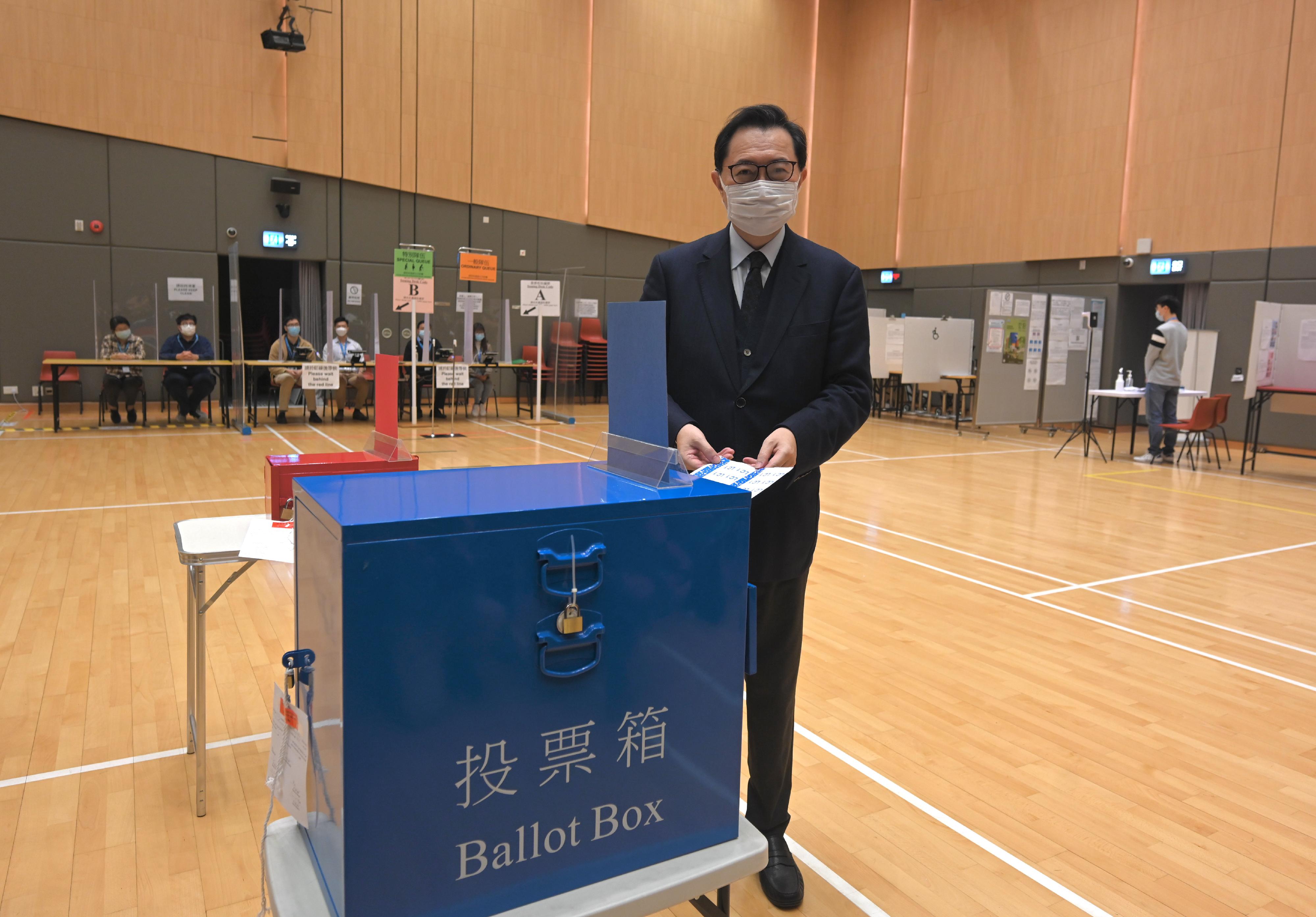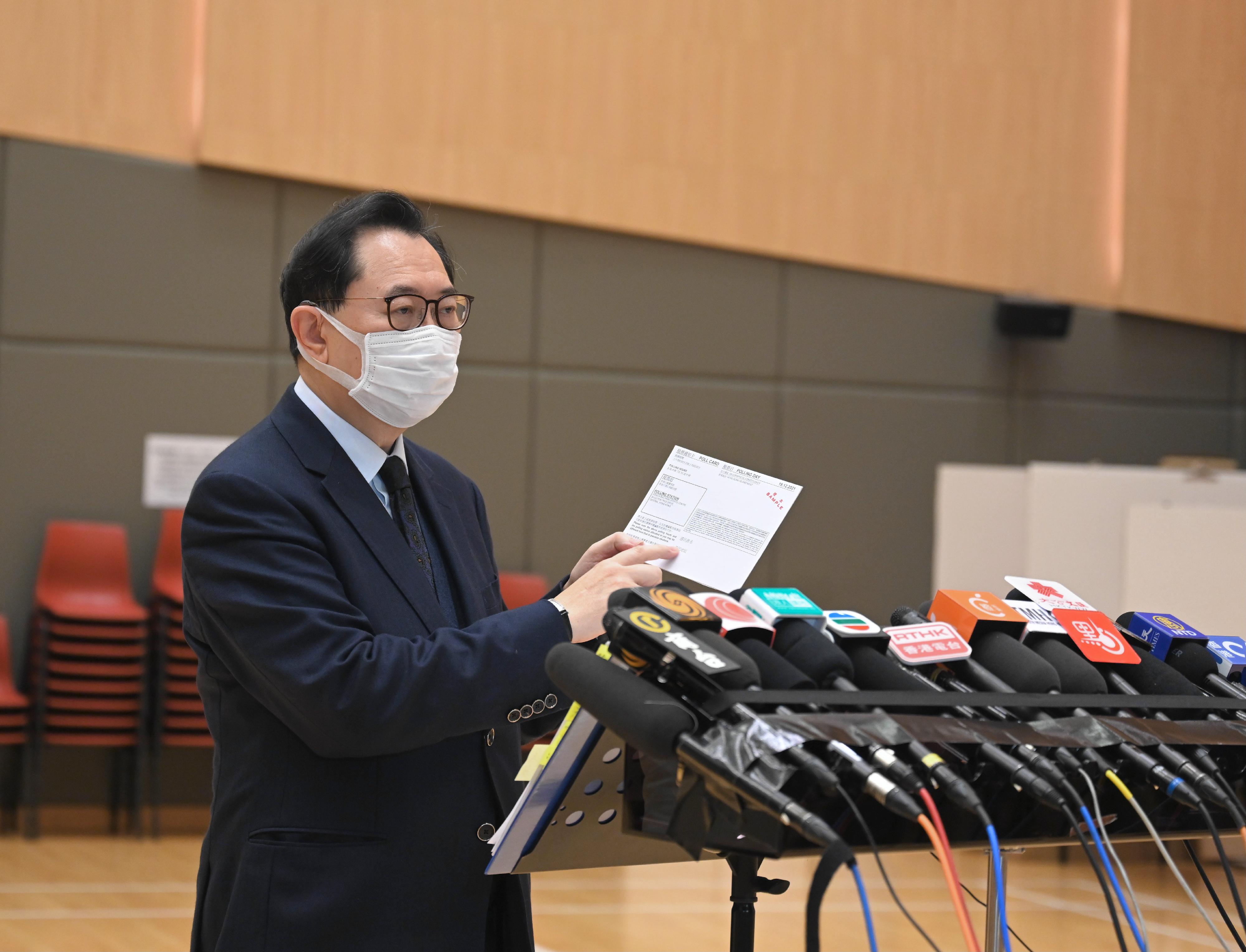The following is issued on behalf of the Electoral Affairs Commission:
The Chairman of the Electoral Affairs Commission (EAC), Mr Justice Barnabas Fung Wah, called on electors to exercise their civil rights to vote and to follow proper voting procedures in the Legislative Council General Election (LCGE) to be held this Sunday (December 19).
"In accordance with the law, only registered electors on the 2021 final registers of electors are eligible to vote on the polling day. I would like to point out that the former District Council (Second) functional constituency (FC) has been deleted. Thus, the majority of the registered electors will only have one vote in the geographical constituency (GC) election in this LCGE, which is different from the 'one-person-two-votes' arrangement in the past. In other words, most of the registered electors will only be issued with one ballot paper for the relevant GC," Mr Justice Fung said after visiting a mock polling station at the North Point Community Hall today (December 14).
He also reminded electors that they must carry the original of their Hong Kong identity card to the designated polling station as specified on their poll card to vote. An elector may vote only at the polling station allocated to him/her. A list of the polling stations has been published in the gazette on November 26. Electors who have yet to receive the poll card should confirm their registration status via the Online Voter Information Enquiry System (OVIES) (www.voterinfo.gov.hk) or call the hotline of the Registration and Electoral Office (REO) (2891 1001) to ensure voting is smooth on the polling day. Through the OVIES, electors can check the name and address of their designated polling station, its location on the map and other polling information.
The mock polling station at North Point Community Hall is one of four mock polling stations open for electors to familiarise themselves with voting procedures for the LCGE. The other three are at Kwun Tong Community Centre, Tai Po Community Centre and Tseng Choi Street Community Hall. Disease prevention measures will be implemented in the mock polling stations, including all persons must wear their own masks, use hand sanitiser and have their body temperature checked before entering the mock polling stations. If they have fever symptoms, they will not be permitted to enter the mock polling stations.
The mock polling stations will be open from today until Friday (December 14 to 17). Today's opening hours are from 4pm to 8pm, and they will be open between noon and 8pm from tomorrow (December 15) until Friday. A hotline at 2967 0416 and a fax line at 2834 0934 have been set up to arrange appointments for group visits.
Polling stations and polling hours
"Polls will be conducted for all constituencies. A total of 153 candidates will run for 90 seats on the polling day. About 630 ordinary polling stations and not more than 24 dedicated polling stations will be open on the polling day for about 4.47 million registered electors to cast their votes. The polling hours for the ordinary polling stations and the dedicated polling stations set up at police stations will be from 8.30am to 10.30pm. For the dedicated polling stations set up at penal institutions, for security reasons, the polling hours will be from 9am to 4pm," Mr Justice Fung said.
As in the past electoral arrangement, eligible electors can cast all the votes which he/she is entitled to cast at the same polling station. The electors of GCs must use the chop provided by the polling station to stamp a tick in the circle opposite the name of the candidate of their choice on the ballot paper inside a voting compartment, and then insert the ballot paper into the blue ballot box with the marked side facing down. As for FCs, an elector or authorised representative of corporate electors should insert the ballot paper into the red ballot box with the marked side facing down.
The electors of the Election Committee constituency (ECC) will be allocated to the polling station at the Hong Kong Convention and Exhibition Centre (HKCEC) to cast all the votes which he/she is entitled to cast.
"Optical mark recognition (OMR) machines will be set up in the polling station at the HKCEC for electors to verify whether the number of candidates against whom he/she marked on the ballot paper is equal to 40. Staff will assist electors in using the OMR machines. ECC electors are encouraged to use the OMR machines to make sure that the number of candidates marked on their ballot paper is 40 before inserting it into an envelope provided by the polling station and putting the envelope with the ballot paper into the white ballot box. I must emphasise that the OMR machines will never record or count electors' choices marked on their ballot papers."
Electronic Poll Register system
With the assistance of the Office of the Government Chief Information Officer, the Electronic Poll Register (EPR) system will be used for issuing ballot papers at most ordinary polling stations with wired network coverage in this LCGE. Electors must show his/her Hong Kong identity card and temporarily pull his/her mask aside at the ballot paper issuing desk as instructed. The polling staff will scan the elector's Hong Kong identity card with an EPR tablet and issue ballot paper(s). The elector may check his/her name, partial Hong Kong identity card number and type(s) of ballot papers issued to him/her as shown on the tablet at the ballot paper issuing desk during the issuance process. The printed copy of the final register will be used for issuing ballot papers at ordinary polling stations where the wired network coverage is unsatisfactory, or where the polling stations are located in remote area and there are difficulties in installation and technical support.
Queuing arrangements
Two queues will be set up at the polling station, one special queue for persons in need including persons who are aged 70 or above, pregnant women and persons who have difficulties in standing for a long time to queue due to their physical condition, while another one will be for the ordinary electors. Relevant signage will be set up at the polling stations. Seats will also be provided in the polling station for any electors in need of rest, and to queue afterwards for collecting ballot papers. While the REO will increase the number of ballot paper issuing desks in the polling stations as far as practicable, the Presiding Officers (PROs) will flexibly deploy the ballot paper issuing desks, with a view to reducing the overall waiting time.
On the polling day, electors can check the approximate waiting time of each ordinary polling station on the election website (www.elections.gov.hk), i.e. less than 30 minutes, about 30 to 60 minutes or about 60 to 90 minutes etc. Relevant signage will also be placed outside the polling stations for electors' reference. Depending on their schedule, electors can make their own arrangement to vote during the polling hours or choose to vote when fewer electors are waiting.
Mr Justice Fung reminded, "According to past election experience, more electors vote in the first two hours of the polling hours. If many electors vote during the first two hours, the waiting time will generally be longer. In order to avoid the long queues at polling stations resulting from too many electors voting at the same time, electors should try to avoid voting during the first two hours on the polling day, but vote at noon or in the afternoon when fewer electors go to vote. However, if electors can only vote in the morning, they may inevitably have to wait for a longer period of time."
The ballot is autonomous and secret. An elector must mark the ballot paper(s) on his/her own in the voting compartment. If in need, an elector may request the PRO or the PRO's deputy to mark the ballot paper on his/her behalf according to his/her voting preference in the presence of one polling staff as a witness. It is an offence for any elector to disturb others, use electronic devices for communication, take photographs, or make video or audio recordings at a polling station. No facial recognition device will be installed in the polling stations.
No using "LeaveHomeSafe" for casting vote(s)
Mr Justice Fung said, "At present, there is no electoral law requiring electors to use the 'LeaveHomeSafe' mobile application before entering the polling stations. In addition, electors only stay inside the polling stations for a comparatively short period of time, and they have to comply with safety measures which include keeping social distance, wearing a mask and no discussion between electors. Voting is an important civil right, while anti-epidemic measures are also very important. We try to strike a balance between voting rights and disease prevention. As such, all electors are not required to use the 'LeaveHomeSafe' mobile application or other alternative measures when entering polling stations to cast their vote(s). The REO will co-ordinate with the government departments or venue managers of the buildings where polling stations are located, and post a notice to remind electors that if they enter the relevant buildings solely to vote, they do not need to use the 'LeaveHomeSafe' mobile application."
Safety measures in response to COVID-19
The REO will implement a number of measures to prevent the spread of COVID-19 in the polling and counting stations, which include requiring all polling and counting staff to wear surgical masks or other protective equipment recommended by the Centre for Health Protection (CHP); not allowing staff with fever symptoms to perform election duties; placing transparent partitions at ballot paper issuing desks to separate the staff and electors; requiring electors, candidates, their agents and the members of the public who observe the count to wear their own masks, use hand sanitiser and have their body temperature checked before entering polling and counting stations; and ensuring that electors maintain social distancing.
  
"Given that candidates or their agents will stay in the polling and counting stations for a relatively long period of time, if they have fever symptoms, they will not be permitted to enter polling and counting stations, and they may assign an agent without fever symptoms as a replacement. An elector with fever symptoms will be directed to a special voting compartment in the polling station to vote as it will only take a short time. The special voting compartment will be disinfected by staff after each use. Polling stations will be disinfected by staff with cleaning supplies when necessary," Mr Justice Fung said.
The REO has produced a short video on the polling procedures and preventive measures for COVID-19 to be implemented in the polling stations. The video has been uploaded to the websites of the EAC (www.eac.hk), the REO (www.reo.gov.hk) and the election website (www.elections.gov.hk) for reference.
Temporary polling stations at boundary control points
Since the outbreak of the COVID-19 pandemic, cross-boundary travel between the Mainland and Hong Kong has yet to be fully resumed while there is a large number of Hong Kong residents who are still in the Mainland. In response to this situation, the HKSAR Government has decided to set up polling stations on the Hong Kong side of Hong Kong/Shenzhen boundary control points (BCP polling stations) to enable electors who are now in the Mainland to return to Hong Kong to vote. This arrangement complies with the relevant legal requirements and enables electors to exercise their voting rights. To this end, the HKSAR Government has requested the relevant Mainland authorities to provide necessary assistance and support. The Mainland immigration control authorities have agreed to temporarily open the boundary control points corresponding to the Heung Yuen Wai, Lo Wu and Lok Ma Chau Spur Line boundary control points, viz. Liantang, Luohu and Futian checkpoints. The Mainland authorities for public health protection management have agreed that, under the condition that the specified health protection requirements are met, electors who have successfully registered for the arrangement may be exempted from the centralised quarantine or medical surveillance requirement of the Mainland if they return to the Mainland immediately after casting their votes at designated BCP polling stations. To complement the Arrangment, three temporary polling stations will be set up at Heung Yuen Wai, Lo Wu and Lo Ma Chau Spur Line control points respectively.
Electors must have made online pre-registration between December 1 to 8 and obtained confirmation so as to vote at the designated polling station at the boundary control points. Electors should have received a "notification of registration" result via SMS or email from the REO after successful pre-registration. The concerned elector must vote at the designated temporary polling station at the boundary control point during the prescribed time slot on the polling day. For details, please visit the dedicated webpage (www.elections.gov.hk/legco2021/eng/bcp.html).
Polling station at Penny's Bay Quarantine Centre
Moreover, the REO will set up a polling station at the Penny's Bay Quarantine Centre (PBQC) for the electors under compulsory quarantine to vote. Polling hours are from 9am to 4pm. After the close of polls, the ballot boxes will be thoroughly disinfected before being transported out of the PBQC, while every ballot paper will be disinfected by an ultraviolet light machine. All disinfected FC ballot papers will be sent to the central counting station for counting, while the GC ballot papers will be sent to the main counting station of the respective GCs for counting. The REO will continue to monitor closely the development of the epidemic, seek advice from the Food and Health Bureau and the CHP, make assessments and work out different plans based on the situations.
Counting arrangements
After the close of polls, polling stations (except for small polling stations at which less than 500 electors are assigned to vote, dedicated polling stations, the ECC polling station and the polling station at the PBQC) will be designated as counting stations for the counting of GC votes. The ballot boxes of all FCs and the ECC will be delivered to the central counting station at the HKCEC for counting.
"Except the exempted persons (i.e. persons who are aged below 12 or aged 65 or above, and those with disabilities that render use of the 'LeaveHomeSafe' mobile application difficult), every candidate, agent and the public who observe the count entering the counting stations, the central counting station and its media centre must use the 'LeaveHomeSafe' mobile application as in general they will stay there for a relatively long period of time. The exempted persons are required to complete a record form to register their names, the first four digits or letters of their identification documents, their contact numbers and the date and time of their visits before entering the counting stations.
"The BCP polling stations will adopt closed-loop management. After polling hours, the polling stations will be turned into counting stations. Except for electors who have been assigned to the BCP polling stations, candidates or their agents and electoral staff, entry to or exit from the BCP polling stations will be prohibited and public observation of the counting process will not be arranged. Candidates or their agents can apply to enter the counting stations to observe the counting process. In order to enhance the openness and transparency of the counting process, ICAC officers will monitor the process and the REO is making arrangements for live broadcast the situation thereat. Details will be announced later."
All election results will be announced at the media centre in the central counting station. Members of the public can observe the counting process at the designated area of the media centre. Given that social distancing should be maintained among the people in the venue, there will be about 470 seats in the public gallery. Admission to the public gallery will be opened from 9.45pm on December 19 on a first-come, first-served basis. Members of the public admitted to the public gallery will be required to wear a wristband provided by the REO for identification purpose.
Clean elections
According to the latest amendments to the Elections (Corrupt and Illegal Conduct) Ordinance (Cap. 554), it is an illegal conduct to incite any person not to vote, to cast a blank or invalid vote by any activity in public during an election; and it is a corrupt conduct if a person willfully obstructs and prevents another person from voting at an election. Additionally, the polling staff will report to law enforcement agencies if any person is suspected to have queued up repeatedly or used other ways to obstruct others from voting.
  
For enquiries, please call the REO's hotline on 2891 1001 or visit the election website (www.elections.gov.hk) for more information on the election.
Follow this news feed: East Asia









